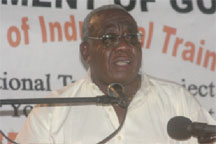Local business support organisations continue to lobby for an end to the impasse which is stymieing the passage of legislation that will clear the way for the government to forge ahead with the Amalia Falls Hydroelectric Project, while seeking to steer clear of the political minefield that has arisen over the project.
Earlier this week, both the Guyana Manufacturing and Services Association (GMSA) and the Upper Corentyne Chamber of Commerce and Industry (UCCCI) weighed in on the issue, siding with the Private Sector Commission (PSC) and calling for an end to what it said was a political impasse.
UCCI President Krish-nanand Jaichand, in a statement sent to Stabroek Business on Tuesday called on parliamentarians to “quickly resolve the issues” surrounding the proposed legislation on the Amalia Falls project.

According to the statement, the high cost of electricity was “the most significant impediment to more rapid private sector growth in Guyana” and Guyana will remain “ages away” from being a destination that is truly competitive “until we fix the cost of electricity”.
Calling for “swift action on the passage of two critical pieces of legislation” associated with the government proceeding with the Amalia Falls Hydroelectric Project, the GMSA said that a halt to it could result in higher electricity rates and the collapse of the manufacturing sector.
The statement said the GMSA had long been appealing to “the powers that be” to reduce the cost of energy. The statement added that by itself energy is “the single most debilitating factor inhibiting the incremental growth of Guyana’s manufacturing sector.”
In a statement that painted a grim picture of the overall consequences of the high cost of energy, the GMSA said companies that provide essential and social services have been “tottering under the impact of high energy charges”.

The statement added that high energy costs “continue to be the deciding factor that has turned away numerous foreign investors” and put out of operation many new and existing businesses while resulting in significant job losses.
It added that the country’s fortunes and prospects were “dwindling fast” on account of high energy costs.





